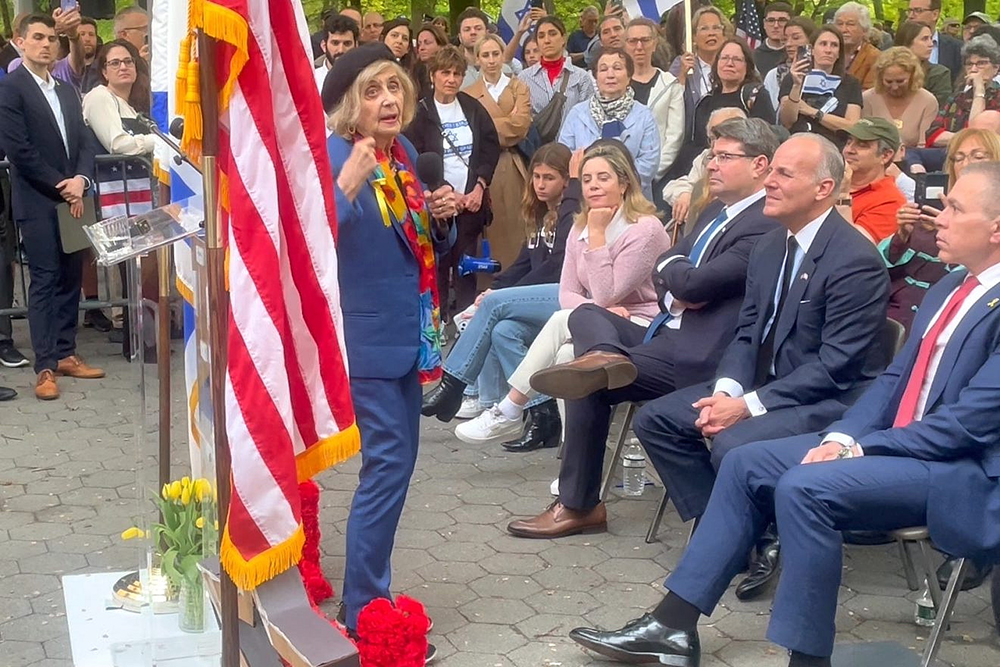|
Getting your Trinity Audio player ready...
|
“We owe it to every future generation of Jews to take these threats and chants that we hear today on our campuses, on our streets and through the media seriously,” a Columbia University student said.
By: Mike Wagenheim
Holocaust Remembrance Day, Yom Hashoah, generally focuses only on the slaughter of 6 million Jews without comparing it to anything else.
But a memorial ceremony marking the day on Monday in New York City near Columbia University turned out to be many things. It was part memorial, part condemnation of Hamas’s Oct. 7 terror attack on Israel—and the global reaction to that massacre—part rally for the release of hostages Hamas holds in Gaza and part lamentation of the waywardness across U.S. college campuses.
Gilad Erdan, the Israeli ambassador to the United Nations, told the some 1,000 people in attendance along Manhattan’s Riverside Drive that the Holocaust started not with the gas chambers but with the creation of an atmosphere through which to delegitimize Jewish existence.
It has become “prevalent to delegitimize the existence of the one and only Jewish state,” he said. “That’s because they prepared the ground for the extermination and the justification of the extermination of Jews, as was seen on Oct. 7, and through today.”
Those in attendance came to “stand together and convey a powerful message that we will not tolerate these hateful and shameful words, and will not tolerate the delegitimization of the Jewish people,” Erdan said.
The Israeli envoy noted that the hate and delegitimization can be heard on college campuses, including at Columbia, and called on elected officials to make antisemites “pay a heavy price.”
Ofir Akunis, Israel’s newly installed consul general to New York, said the evening’s message was simple. “No one will succeed in defeating us,” he said. “No one will erase the power of the Star of David.”
The Israeli-American Council organized the event, billed as “Never Again Is Now.”
It featured a mix of songs and speakers, including diplomats, IAC executives, Jewish personalities, Columbia University students and the prominent Holocaust survivor Tova Friedman. Speakers delivered messages of anger and of hope to an Israeli- and American flag-waving crowd, flanked by a noticeable security presence.
Too laid back
An 86-year-old TikTok star (with more than half a million followers), Friedman told JNS that it was critical to keep her stories of Holocaust pain and survival alive.
“If I didn’t, Hitler would win,” she told JNS. “He wanted us to die, and I’m alive. I’ve got four children and eight grandchildren. I don’t want to just survive. The only way you can win is that you thrive.”
Despite fears that another genocide of Jews worldwide may loom, Friedman is convinced another Holocaust isn’t instore.
“I don’t feel that. I was in Washington, D.C., this morning. They are very upset about what’s going on in our country,” she told JNS of her meetings in Congress.
“I think the American youth has been very laid back. They don’t know so much about Judaism,” she said. “I think we have to strengthen them.”
History repeats
Jewish influencer and activist Lizzy Savetsky said that history inevitably repeats itself when it isn’t remembered and its lessons aren’t learned.
In 1933, Germans barred Jewish students from entering campus. Hitler had started his propaganda organization accusing Jews of conspiracies and blood libels.
“We’re seeing the same exact thing today,” Savetsky told JNS. “If you don’t wake up and open your eyes and pay attention, we could very easily end up back there.”
Savetsky, who is active on social media, said that many pro-Israel activists are suffering from burnout. Supporting Israel is a “marathon,” she said.
Being “outwardly Jewish” is the best way to fight antisemitism, Savetsky believes.
“The most important thing that we can do is continue to spread the truth. Education is our best weapon,” she told JNS. “We are up against people, who have no problem telling whatever lie that they need to tell in order to perpetuate their narrative. Nonetheless, we can’t afford to be silent.”
As difficult a time as the Israeli people are enduring, Knesset member Simcha Rothman, who attended the New York memorial, said that they must support their Jewish brothers and sisters abroad.
Many Jews in the Diaspora whom Rothman has met are “very worried” and “see some similarities to what happened in Germany” prior to World War II, he said.
“We’re fighting not only for ourselves. We’re fighting to keep the State of Israel as a safe haven for the Jews in Israel and in the world, at large,” and to apply “political and international pressure” on the Biden administration to address it, he told JNS.
Three students at Columbia University, which has been the target of coordinated Jew-hatred that has also spread to other campuses throughout the country, shared their experiences with attendees on Monday.
Sonya Poznansky, a senior studying biology in Columbia’s dual-degree program with Tel Aviv University, said that she has learned since Oct. 7 that when people say that “they want Jews dead, it is our moral responsibility to believe them.”
Poznansky shuffled in and out of bomb shelters during Hamas’s rocket attacks in 2021, escaped a terror attack in Tel Aviv in 2022, had three friends murdered on Oct. 7 at the Nova music festival and “turned page after page of dead Poznanskys” in the Book of Names of Holocaust victims.
She said the recent calls for the murder of Jews in the streets of New York City finally drove home the point for her.
“We owe it to every future generation of Jews to take these threats and chants that we hear today on our campuses, on our streets and through the media seriously, and to promise ‘Never Again,’ she said.
“I am so grateful to be here today,” she added. “To be alive to tell my family’s story and to remember those who had their lives and their potential future generations so viciously taken from them.”
(JNS.org)






